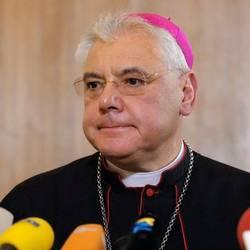By Gerhard Ludwig Müller
Vatican Insider
October 16, 2011
http://vaticaninsider.lastampa.it/en/homepage/the-vatican/detail/articolo/america-latina-latin-america-papa-el-papa-pope-congregazione-per-la-dottrina-della-fede-congre/
 |
| Gerhard Ludwig Müller |
Gerhard Ludwig Müller is the Bishop of Regensburg. A personal friend of Benedict XVI, in Germany they deem him a defender of Catholic Orthodoxy. In Rome his name is one of the most mentioned as the man who will succeed to Cardinal William Joseph Levada at the Congregation for the Doctrine of the Faith, the former Holy Office. Only a few know that he is also a pupil of Gustavo Gutiérrez, the "father" of Latin-American liberation theology, with whom he has a long and close friendship.
His academic career is impeccable. In addition to having been a University Professor at the University of Ludwig- Maximilians of Munich, he was invited as a professor by several Universities in Peru, Spain, USA, India, Italy and Brazil. A published author, his most famous work is "Dogmatism: Theory and Practical Aspects of Theology".
A member of the Commission for the Doctrine of the Faith of the German Bishops' Conference, from 1998 to 2002 he participated to the International Theological Commission. Bishop of Ratisbon since October 1st, 2002, in his native land he is also known as a paladin of true doctrine, among other things, since his diocese stopped the dissident movement "We are the Church".
This liberal group (that defends married priesthood, women priests, homosexuality and other extravagant ideas) has publicly declared its anger against him and has also tried to boycott the visit of Benedict XVI in Bavaria in 2006 with public, yet unsuccessful, protests. The same organization has also sent to the Vatican a letter of protest against a reform of the dioceses' structure approved by the Bishop, which took power and importance away from "We are the Church".
For these reasons and because of his personal friendship, he has enjoyed the trust of Joseph Ratzinger for years, to the point where he was appointed as the person in charge of handling his "Opera Omnia": a series of books that will collect, in a single edition, all the writings of the theologian Pope, a responsibility that keeps him close to Rome and to the Church "elite".
But the Regensburg priest also has strong ties with Latin America. From 1998 to date, he has travelled to Peru every year to follow the courses taught by Gustavo Gutiérrez, who he deems to be his mentor and friend. He frequented a few theological workshops in the seminaries of Cusco, Lima and Callao in addition to living for months with the farmers of a parish in the vicinity of Lake Titicaca, on the border with Bolivia.
In November 2008, this old relation led to him being awarded a "honoris causa" doctorate at the Pontifical Catholic University of Peru (PUCP), the same university that is currently involved in an institutional conundrum as it states it is against the authority of the Lima's Cardinal, Juan Luis Cipriani Thorne, and the instructions of the Holy See. A University where the most significant progressive movements of Peru found their origins, including the pro-gay lobby.
"My experiences with theology and liberation" was the title of the conference held by Müller during the ceremony in his honor. On that occasion he spoke at length about his relationship with Gutiérrez and explained his reasons for supporting this theological current.
"I am not referring to the theology of liberation in an abstract and theoretical form, or in an ideological fashion, to praise the progressive ecclesial group. At the same time I do not even fear that this could be interpreted as a lack of orthodoxy. The theology of Gustavo Gutiérrez, independently of how you look at it, is orthodox because it is orthopractic and it teaches us the correct way of acting in a Christian fashion since it comes from true faith," he stated during his speech.
Even though he specified that that theology has nothing to do with politics, he dedicated half his speech to the condemnation of the "infamy of our age: neoliberal capitalism" and its consequences.
It is common knowledge that Gutiérrez's thoughts were never censored by the Holy See, even if they asked to modify a few of his writings. His statements triggered an intense international theological debate. When Joseph Ratzinger was Prefect, he had to intervene with two key statements on this discussion: both in 1984 and in 1986.
Despite the intent of Gutiérrez to separate his ideas from political activism, the truth is that in Latin America his writings served as inspiration for the followings of a "Catholic Marxism" a sort of revolutionary action that reached the point of justifying violence. And the main issue resides there. The activists of these Latin American movements of the recent past now share some of the ideas of "We are the Church", the group that Müller tried to fight off in his country.
Any original material on these pages is copyright © BishopAccountability.org 2004. Reproduce freely with attribution.